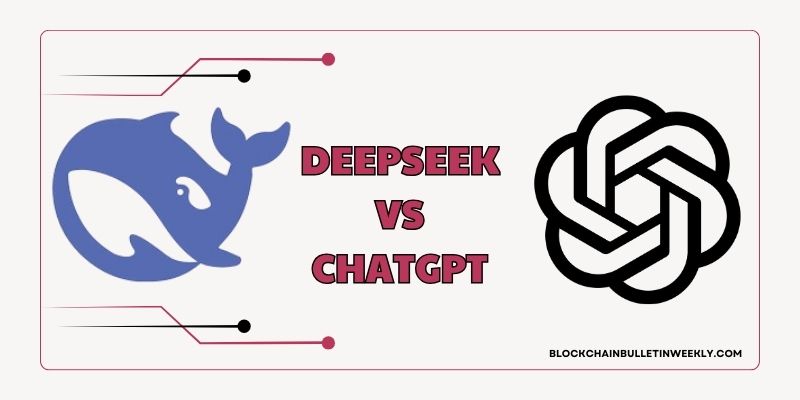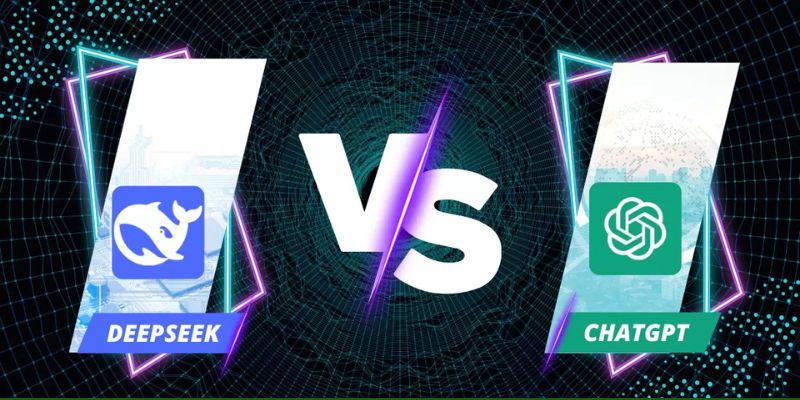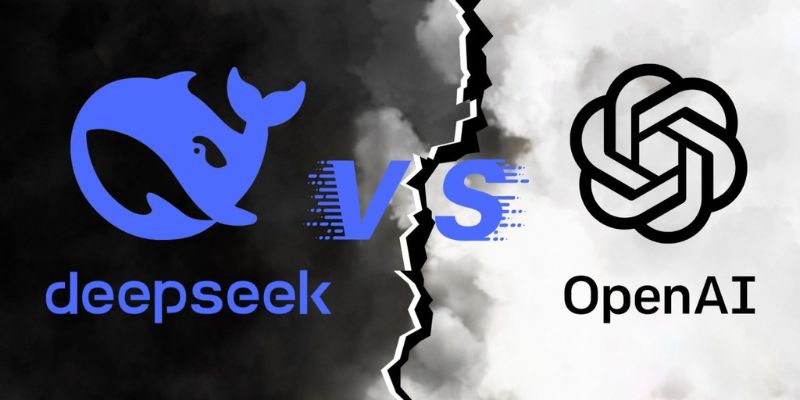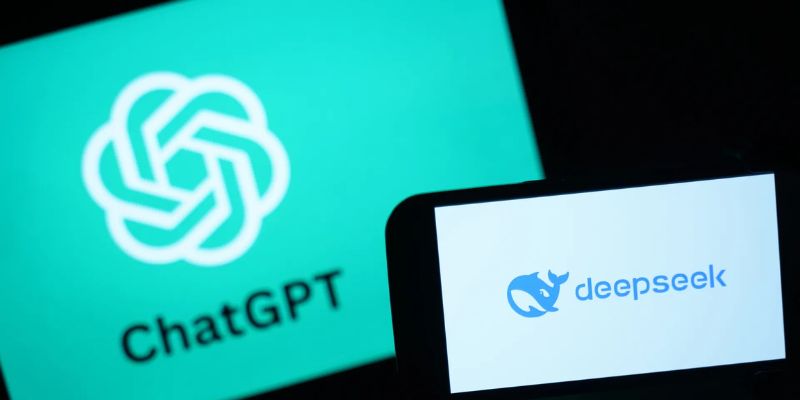DeepSeek vs ChatGPT – the battle between two leading AI chatbots is causing a stir in the tech community. While OpenAI’s ChatGPT has cemented its position with outstanding creative capabilities, DeepSeek – a newcomer from China – stands out with its fast processing speed and free access to many features. Can DeepSeek challenge ChatGPT’s throne and become the top choice in 2025?
Overview of DeepSeek and ChatGPT
In the context of increasingly strong artificial intelligence development, DeepSeek vs ChatGPT is becoming the most notable confrontation between two leading chatbot platforms. Each platform has its own advantages, reflecting the development philosophies of the two AI ecosystems from China and the United States.
DeepSeek – An Ambitious AI Newcomer
DeepSeek is an AI chatbot developed by DeepSeek AI, recently announced and quickly gaining attention for its powerful language processing capabilities. This platform uses the DeepSeek-R1 model, trained on a huge amount of data and optimized for fast response speeds. With the ambition to compete directly with Western platforms, DeepSeek focuses on multilingual processing capabilities, especially Chinese and English.
One of the highlights of DeepSeek is the free availability of many advanced features that other platforms often charge for. This helps DeepSeek quickly reach a large number of users, especially in the Asian market. However, because it is developed in the strict censorship environment of China, DeepSeek may encounter some limitations in handling sensitive or global topics.
ChatGPT – OpenAI’s AI Giant
Launched in 2022, OpenAI’s ChatGPT has quickly become the world’s most popular AI chatbot platform. With continuous upgrades through the GPT-3, GPT-4, and GPT-4 Turbo versions, ChatGPT is constantly improving its logical thinking, content creation, and user support capabilities in many different fields.
Unlike DeepSeek, ChatGPT not only focuses on speed but also emphasizes creativity and deep contextual understanding. This helps the platform become a powerful tool in writing, programming, research, and natural communication. However, a major limitation of ChatGPT is the high price for the Plus version and API, causing many users to seek cheaper alternatives.
Detailed Comparison of DeepSeek vs ChatGPT
DeepSeek vs ChatGPT is becoming a hot topic in the tech world as both platforms are continuously improved and compete directly in the AI chatbot market. While OpenAI’s ChatGPT maintains its leading position, DeepSeek is emerging as an ambitious competitor, especially in the Asian market. So what are the main differences between these two platforms, and which platform will gain the advantage in the AI race?
Performance and Response Speed
One of the important factors when evaluating an AI chatbot is processing and response speed. DeepSeek has an advantage as it is optimized to answer quickly, especially in short queries. This makes the platform ideal for tasks that require instant responses, such as quick information retrieval or automatic customer support.
In contrast, although ChatGPT has a slightly slower response speed, it shows an advantage in long and complex conversations. Thanks to its ability to maintain context and analyze in depth, ChatGPT often gives more detailed and highly inferential answers. This is very useful for users who need to write content, program, or conduct in-depth research.
Creativity and Conversational Context
ChatGPT is highly appreciated for its content creation capabilities, from writing articles and telling stories to supporting complex programming. This AI can develop ideas, build logical arguments, and even play different styles in conversation.
Meanwhile, DeepSeek tends to stick to information more, giving direct answers and less inclined to be creative. This helps DeepSeek avoid giving overly speculative responses, but also makes it less flexible in situations that require breakthrough thinking.
Multilingual Support and Content Censorship
DeepSeek is strongly optimized for Chinese and English, but has not really stood out in supporting other languages. In addition, because it is developed in China, this platform is subject to strict censorship, which may limit some sensitive topics.
In contrast, ChatGPT has the ability to handle many different languages well and is less censored, helping users have a freer experience in searching and creating.
Integration and Scalability
ChatGPT is already present in many applications, from Microsoft Copilot to large enterprise platforms, providing high flexibility. DeepSeek is still in the ecosystem expansion phase, but if it can take advantage of the Asian market, it could become a formidable counterweight in the future.
The AI Race – Who Will Win?
In the DeepSeek vs ChatGPT confrontation, both AI platforms are constantly developing to win the top position in the global chatbot market. This competition does not only stop at processing performance or content creation capabilities but also extends to development strategy factors, integrated ecosystems, and user accessibility. So who will be the ruler in this AI race?
The War of Technology and Performance
The core difference between DeepSeek and ChatGPT comes from how they are trained and optimized. DeepSeek, with its strengths in speed and accuracy, is designed to provide quick and concise answers, suitable for information retrieval or business support tasks. In contrast, ChatGPT is more inclined towards logical thinking and creativity, creating emotional content, supporting in-depth research, and maintaining longer conversations.
In terms of performance, DeepSeek may have an advantage in situations that require quick responses, especially chatbot applications in customer service. However, ChatGPT with its extensive contextual analysis capabilities may continue to maintain its number one position for users who need in-depth content.
The Race for Influence and Ecosystems
ChatGPT has had a huge advantage thanks to the support from OpenAI and strategic partners like Microsoft. This helps it become not only a simple chatbot but also a tool integrated in a series of applications such as Microsoft Copilot, educational platforms, and businesses.
DeepSeek, although a new name, has the potential to develop strongly in the Chinese market, where Western products like ChatGPT are limited. If DeepSeek takes advantage of this to expand its AI ecosystem, it can quickly become a formidable competitor, especially in the field of enterprise AI and information retrieval.
It is very difficult to say whether DeepSeek or ChatGPT will prevail because both are following different development paths. ChatGPT currently maintains its advantage thanks to its strong integration network and outstanding creative capabilities, but DeepSeek has the potential to turn the tables thanks to its fast processing speed and market expansion strategy.
Notes When Using DeepSeek and ChatGPT
In the DeepSeek vs ChatGPT confrontation, choosing and using them correctly will help you maximize the benefits of both platforms. Here are some important notes when using them.
- If you need a fast and accurate response, DeepSeek is the ideal choice. Meanwhile, if the job requires creativity and in-depth analysis, ChatGPT will respond better.
- Both platforms can make mistakes. Therefore, you need to cross-check information with reputable sources, especially in sensitive fields such as finance and medicine.
- Both AIs collect user data. Be careful when sharing personal information and avoid providing sensitive data.
- The free versions of both DeepSeek and ChatGPT have limitations. If you need advanced features, consider upgrading to the paid version.
The DeepSeek vs ChatGPT battle is still undecided as each platform has its own strengths. If you need a creative AI chatbot that supports well in many fields, ChatGPT is still the top choice. But if you prioritize speed and free access, DeepSeek is a worthy opponent to consider. In the future, Blockchain Bulletin Weekly believes that the AI race promises to be even more intense as both platforms continuously improve and expand features.




